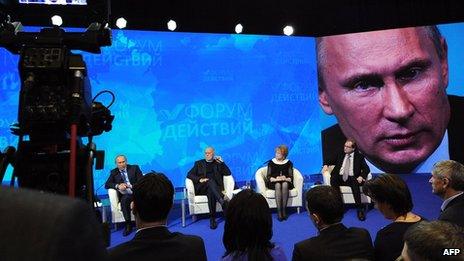Russian news agency RIA Novosti closed down
- Published

Russia's President Vladimir Putin has abolished the country's state-owned news agency RIA Novosti.
In a surprise decree published on the Kremlin's website on Monday, Mr Putin announced it would be replaced by a news agency called Russia Today.
The new agency will be headed by journalist and keen Kremlin supporter Dmitry Kiselev.
The state-owned Voice of Russia radio station has also been closed. The decree was effective immediately.
Sergey Ivanov, the head of the Kremlin administration, has told journalists in Moscow that the news agency is being restructured in order to make it more economical while increasing its reach, Interfax reports.
Mr Ivanov was quoted as saying that the agency, which is being dissolved and reorganised as International News Agency Russia Today, needs to make "more rational use of public money" and that it has to be more effective.
"Russia pursues an independent policy and robustly defends its national interests. It's not easy to explain that to the world, but we can and must do this," he said.
For many Kremlin critics in Russia, that phrase suggests this is a sinister move by President Putin, says the BBC's Daniel Sandford in Moscow.
During Mr Putin's time as Russia's leader, RIA Novosti has tried hard to produce balanced coverage for Russian and international audiences, our correspondent says.
Although state-owned, it has reflected the views of the opposition and covered difficult topics for the Kremlin, our correspondent adds.
Mr Kiselev is known for his ultra-conservative views, including recently saying that gay people should be banned from giving blood, and that their hearts should be burnt rather than used in transplants.
Reporting on its own demise, RIA noted in its news report that "the move is the latest in a series of shifts in Russia's news landscape, which appear to point toward a tightening of state control in the already heavily regulated media sector".
- Published9 December 2013
- Published3 October 2013